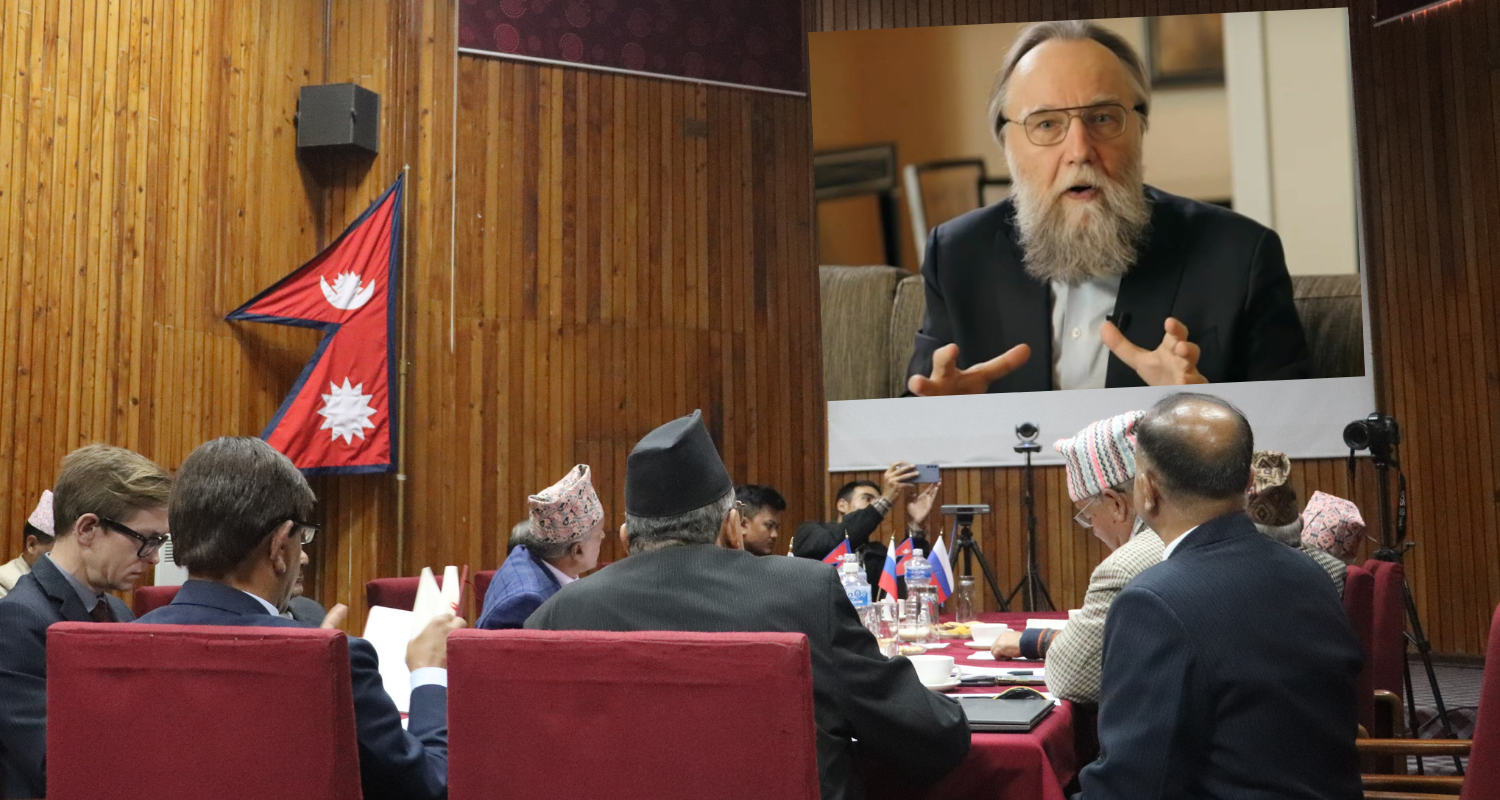
Kathmandu (Keshav Bhattarai): On November 23, 2024, with the support of the Russian House in Nepal, a conference by philosopher and political scientist Alexander Dugin was held at the Russian House in Kathmandu on the theme “Emerging Multipolarity: South Asian Context”(Зарождающаяся многополярность: южноазиатский контекст). The conference gathered numerous distinguished guests, including ambassadors, scholars, and former ministers. At the very beginning of the event, the broadcast was targeted by hackers who disrupted the live stream with obscene content. But, technical issues were promptly resolved.
Dugin, in his speech, emphasized Nepal’s central role in the context of global multipolarity and the relations between China and India. He highlighted that Nepal, as a small country, has successfully maintained its independence and diplomatically balanced the interests of these two great civilizations.
He emphasized that Nepal’s primary cultural identity is closely tied to India, while the country also experiences a significant influence from Chinese socialism. He believes that there is a special connection between China and India, as two poles of a multipolar world, and that Nepal can play a key role in balancing this relationship.
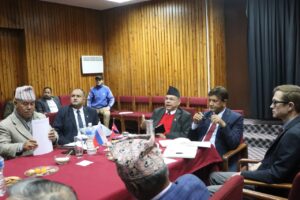
According to Dugin, it is necessary to organize and harmonize the interests of the two civilizational centers to address social and political issues. Nepal, Bhutan, Malaysia, and Indonesia can serve as a boundary between Chinese and Indian cultures, which will help strengthen sovereignty and establish harmonious relations between peoples.
Dugin noted that the concept of multipolarity necessitates a rethinking of Indian identity. He also pointed to the Confucian roots of Chinese civilization and emphasized that Chinese socialism should be viewed not only as a political ideology but also as a profound cultural tradition.
In his speech, Dugin also drew attention to the presence of Islamic cultural influence in the region, stating that Islam poses a significant challenge for the countries of North Asia. He proposed the creation of an Islamic pole that could play a constructive role in regional and international politics. The political scientist also emphasized that the Russian Orthodox Church maintains peaceful civilizational ties with both Islam and Hinduism. Unlike the Western Church, our Church, due to its openness and traditions, does not engage in a struggle against Islam or other religions.
Dugin has emphasized to liberate our mind from toxic illusion of the western domination. Addressing on virtual conference he stressed the need of decolonization of mind. The western civilization is not same as human civilization, its not unique, not the only one and not the universal, he strongly claimed. He said that Asian people have own spiritual civilization, own culture and it should not be affected by western culture. Dugins cleared, “Hindu, Buddhist, Islam, Nepalese should be proud for own cultural, philosophical, metaphysical rules, you should know that is the logic of multipolarity.” Dugin further said, “western values for western people, eastern values for eastern people, Nepalse values for Nepalese people, the same for India, the same for China, the same for Islamic people, African etc.” Next he said that most of the population is in Asia, most of the developed countries in BRICs. According to Dugin: Rusia, China, India, all people from Asia, Latin America, Africa whereabouts, should walk in own values, that is the main aim of multipolarity. He wished a well balanced relationship of Nepal between multipolar nations India and China. Small country of small space with deep cultural rules could influence the global world, he cleared .
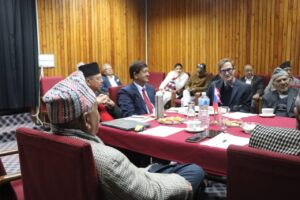
He further said, “multipolarity obviously is not unipolarity, only one political philosophy, only one ideology, what said rules imposed by the west. Multiplarity totally the structure of world.” He said that before colonization there were own civilization of china, India, Islam, Europe , Russia, Africa, Latin America and so on. At present there is only one civilization in the world, that is western civilization which has affected all type of civilization. Now we are at the end of western domination. Modern world has began with colonalism and end of colonization is the end of western power. According to him, now the people of the world need decolonization of mind and gradually declining the western colonization too.
Chief guest of the program, former prime minister of Nepal Jhala Nath khanal expressed the view that transition to a multipolar world presents both challenges and opportunities for Nepal. But Nepal must take a correct path of national development and transformation suited to the emerging national and international development, Khanal said . Khanal further said, “Nepal is not a poor country in resources. But we must be ready to properly utilize those resources according to the above all interest of the country and people. The world is again at a crossroads. The global order is giving way to a new reality-a multipolar world, where power is distributed among multiple nations and blocs. Nowhere is this shift more apparent than in south Asia, a region brimming with potential and navigating complex geopolitical dynamics.”
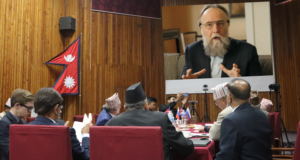
Other participants of the conference also shared their thoughts on the future of inter-civilizational dialogue. One of the speakers, Dipak Gyawali, a former Minister of Energy, Water Resources, and Irrigation, emphasized the need to develop new approaches to the coexistence of diverse cultures, taking into account their histories and values.
Deep Kumar Upadhyaya, former Minister of Culture, Tourism, and Civil Aviation, and former Ambassador to India, emphasized the practical significance of multilateralism and the importance of involving various countries in the process of shaping global strategies in a way that allows each nation to preserve its uniqueness and traditions.
Experts as General secretary, communist party of Nepal maoist center, former minister of law, justice and oarliamentary affairs Mr Dev Gurung, Mr. Lilamani Poudel, former chief secretary and former ambassador of China, Senoir advocate Krishna Prasad Bhandary as well as former president of Nepal Russia friendship society, Mr Basu Misra former ambassador of Shreelanka, senior journalist Narendra Jangh Pitter, Mr. Yogendra Dhakal, former ambassador of Austrelia, Mr. Anton Maslov, first secretary of Russian Embassy and director of Russian house in Kathmandu and Professor Dr. Andrei kojimets,IR Deparment in FEFU expressed view on emerging context “Multipolarity” .
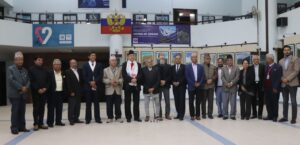
Welcome speech to guest was expressed by Mr. Mohan Gyawali Student of Far Eastern Federal University Vladivostok, Russia. The moderator of the programme Prof. Dr. Yubaraj sangraula, former attorney general government of Nepal admired the contemporary philosopher, Dugin. He said, “multipolarity is the best answer for our survival, sometimes a small country in geopolitical situation may face a lot of problems, though we have maintain very good relationship between India and China, but sometimes international scenerion also create a lot of big problem. Thus multipolarity theory definetly is a very good philosophy for us to understand .”
The conference emphasized the necessity of further studying the issues of multipolarity, which are becoming particularly relevant in the context of globalization and a changing world order. The participants concurred with the view that Nepal can and should play an important role in establishing and maintaining a balance of interests among major powers, which, in turn, will have a positive impact on the region and international relations as a whole.
Professor Dugin expressed gratitude to the organizers for the opportunity to speak and for raising relevant issues, noting that it is important to continue the dialogue between civilizations in order to achieve harmony in the modern world.
Comments